
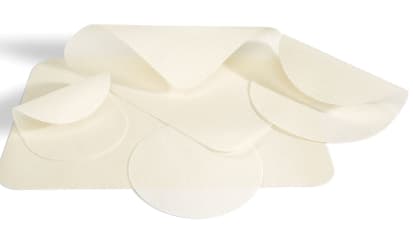 Video
Video
Long-term results for intraperitoneal biomaterial repair of ventral hernias in a real-world, retrospective, multicenter study
This retrospective, multicenter, case review analyzed device/procedure endpoints and patient-reported outcomes in patients treated for hernia repair 1 year or more from study enrollment.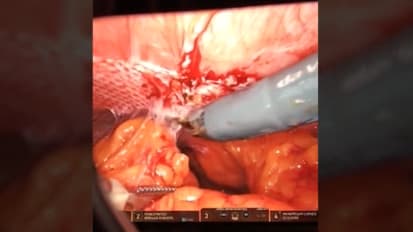 Video
Video
Post-Operative View: 18-Months Post-Implantation GORE® SYNECOR Intraperitoneal Biomaterial Hybrid Mesh
Razvan Opreanu, MD, shares an 18-month post operative view using GORE® SYNECOR Intraperitoneal Biomaterial hybrid mesh. Document
Document
Case Study: Proven Outcomes Reduced Costs for Complex Hernia Repairs
GORE® BIO-A® Tissue Reinforcement is an excellent choice in soft tissue repair, including complex hernia.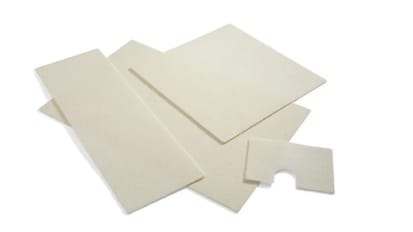 Document
Document
Bio-A Mesh Use in Hiatal Hernia Repair. A Systematic Literature Review
Abdul-Rahman F. Diab, Joseph A. Sujka, Adham R. Saad, Christopher G. DuCoin, Salvatore Docimo present on hiatal hernia repair without mesh reinforcement that is associated with high rates of hernia reoccurrence, reaching more than 50% at 5 years. Document
Document
Long-term results for intraperitoneal biomaterial repair of ventral hernias in a real-world, retrospective, multicenter study
This retrospective, multicenter, case review analyzed device/procedure endpoints and patient-reported outcomes in patients treated for hernia repair 1 year or more from study enrollment. Document
Document
Better AWR Outcomes. Reinforced by Data. Critical healing period and repair strength
GORE® BIO-A® Tissue Reinforcement provides a unique 3D tissue-building scaffold that elicits a specific tissue response during the critical wound healing period. Video
Video
Trends, Tools, Trials: Complex Abdominal Wall Repair in 2020
Matthew I. Goldblatt, M.D., FACS, discusses a case study of a patient undergoing treatment for simultaneous colon and rectal cancers and had a prior low anterior colon resection procedure with a diverting ileostomy. Document
Document
Bioabsorbable Mesh for Hernia Repair: Know your Options
GORE® BIO-A® Tissue Reinforcement is intended for use in the reinforcement of soft tissue. GORE® BIO-A® Tissue Reinforcement may be used include hernia repair as suture-line reinforcement, muscle flap reinforcement, and general tissue reconstructions. Document
Document
A Patient’s Guide to Hernia Repair
While some hernia defects can disappear if they are pressed, this does not permanently resolve the hernia. In addition, because hernias typically worsen over time, the patient should consult a surgeon after a hernia has been identified.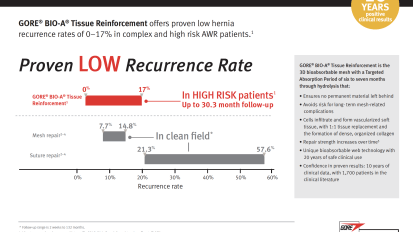 Document
Document
Better AWR Outcomes. Reinforced by Data. GORE® BIO-A® Tissue Reinforcement offers low complication rates in complex and high-risk patients
GORE® BIO-A® Tissue Reinforcement offers proven low hernia recurrence rates of 0–17% in complex and high risk AWR patients. Document
Document
Better AWR Outcomes. Reinforced by Data. Confidence for surgeons and patients in ventral hernia repair
GORE® BIO-A® Tissue Reinforcement is designed as an alternative to longer-term resorbable and permanent meshes to offer a strong repair while avoiding risk for long-term mesh-related complications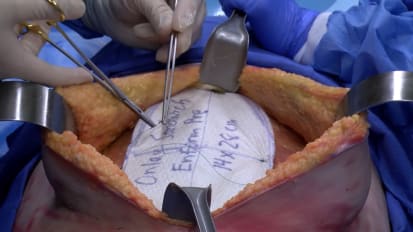 Video
Video
Retromuscular Onlay Hernia Repair Using GORE® ENFORM Preperitoneal Biomaterial
This is an educational surgical technique video demonstrating a retromuscular onlay hernia repair using GORE® ENFORM Preperitoneal Biomaterial. A cadaver model is used for demonstration to facilitate visualization of the anatomy. This educational content provided by John P. Fischer, M.D.